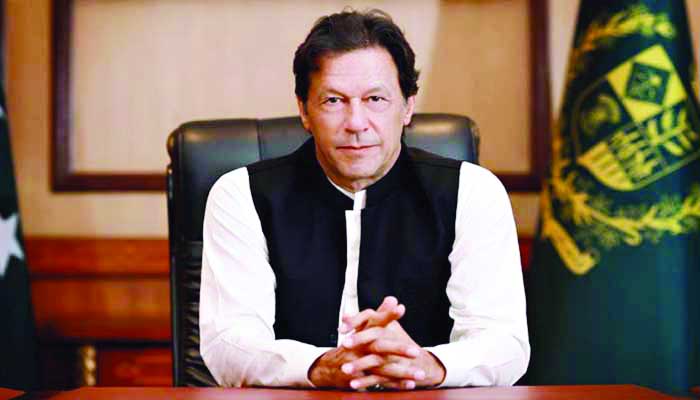Imran Khan may be throwing more ill-thought hurdles our way but is now being hounded at home for mishandling J&K
It is a tough time to be the Pakistan Prime Minister, even if one propped up, coached, tutored and played by the fountainhead of the nation’s real power, the Army. Little wonder then that Imran Khan is at his most vulnerable as his armed invincibility has now been hopelessly blown to smithereens and isn’t scaring anybody in the region. Completely spooked by US President Donald Trump’s stand on Kashmir that it was a bilateral issue between two neighbours and isolated by even the Islamic world that considers the abrogation of Article 370 as India’s internal and administrative matter, Khan is desperately short of ideas and is making one embarrassing counter-move after another. First, he is threatening to close down his country’s airspace to Indian flights, riled by the fact that Prime Minister Narendra Modi used Pakistani airspace to fly to France, a nation that has steadfastly helped India’s line on sponsorship of terror factories. Second, he is urging certain pro-Khalistani Sikhs, who have been used for anti-India propaganda for years, to support him on Kashmir. In a viral video, a Pakistan-based Sikh leader claimed that no less than the highest temporal authority of the Sikhs, namely the Akal Takht, had asked the community to do so. It is another matter that the Takht has passed no such unrealistic resolution. Third, he is threatening to close land routes between India and Afghanistan and block trade, something that is more disadvantageous to his economy than ours. We have already downgraded trade relations and withdrawn Most Favoured Nation (MFN) status to Pakistan since the Pulwama attacks. Khan has proclaimed himself to be a global brand ambassador of Kashmiris and is reminding the world of repercussions in the event of an escalation of Indo-Pakistan hostilities, considering both are nuclear powers. Does he realise that such a strike is the last option any nation would contemplate and obliterate his people as well?
Truth is Khan, and by extension the Pakistani Army, are just moving around traditional counterweights in the strategic chessboard, hopelessly failing to blur the hard-edged reality. And that is since Pulwama, India has stopped being preventive about but rather reactive to Pakistani threats. The Modi brand of Indo-Pak diplomacy has shown that it is not scared to take on Pakistan’s “what could be” scenarios and could frustrate its “thousand bleeding cuts” strategy of exporting terror and separatism, staying well under the nuclear flashpoint. This new-found boldness means Pakistan misadventures on Indian territory are not to be tolerated but acted upon and nipped in the bud. Khan’s emotional appeal to the Islamic world that Kashmir was a matter of protecting Muslim identity has also backfired miserably with the snub from OIC and the UAE. Bahrain named Modi for its highest civilian honour, coopting the centrality of India in economic and strategic cooperation in the Gulf. Even the Taliban, known for its hardline interpretation of Islam, has not warmed up to the Kashmir question, although it has been safe-housed and nurtured by the Pakistan Army. Then its all-weather friend China has been selective in its reaction to India’s mainstreaming of Kashmir, objecting only to the bifurcation of Ladakh and its impact on Aksai Chin that it had taken over after the 1962 war. Besides, given its own problematic record of human rights in minority provinces and with Uyghurs, it doesn’t want to attach itself to causes linked to religiosity or upset its bilateral paradigm with India at the moment, which is far bigger. The Asia-Pacific grouping of the Financial Action Task Force (FATF), the watchdog of nations promoting terror and empowered to restrain international funding, has already put Pakistan on an enhanced blacklist, so most nations would not want to touch it now because of that taint. Now, our western neighbour has to focus on avoiding the blacklist in October, when the final review comes up. If any good has happened to Pakistan, it is that the foreign policy of years is now being questioned by its opposition parties. Bilawal Bhutto has now advised Khan that he better focus on saving Muzaffarabad and Pakistan-Occupied Kashmir, lest that strategic pie also slips out of his hands. Of course, democracy is a long shot in Pakistan but Khan and the Pakistan Army have now got to reconcile that their age-old templates aren’t working or won’t be anymore in a world where politics will be dictated by the economy.
Writer & Courtesy: The Pioneer








 OpinionExpress.In
OpinionExpress.In















Comments (0)